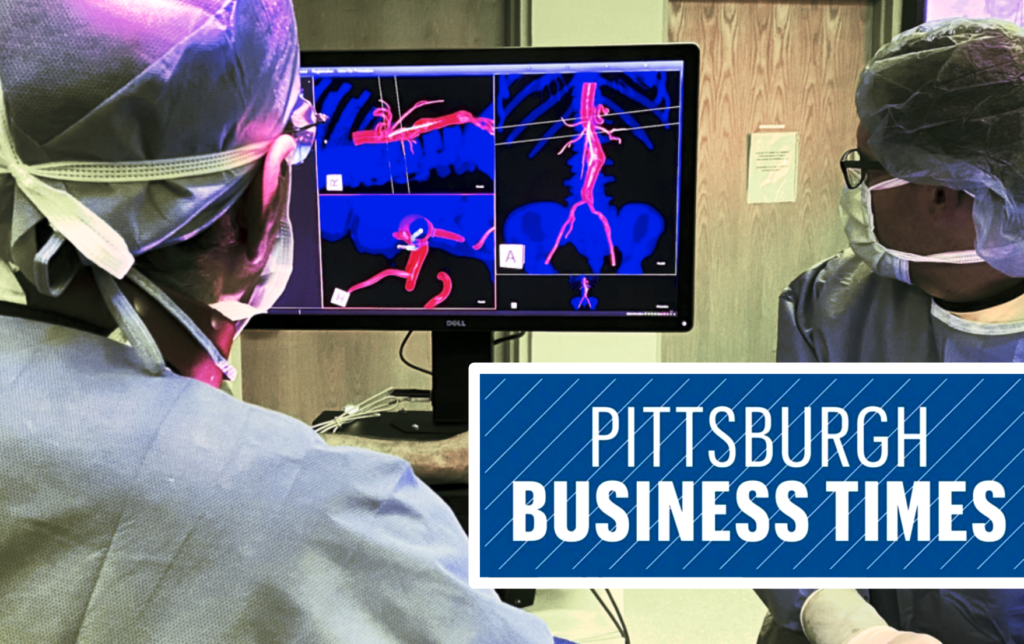
Allegheny Health Network (AHN) has performed more than two dozen surgeries to repair complex abdominal aortic aneurysms using a new technology platform that functions like a GPS navigation system for vascular surgery.
Allegheny Health Network (AHN) has performed more than two dozen surgeries to repair complex abdominal aortic aneurysms using a new technology platform that functions like a GPS navigation system for vascular surgery.
By Lauren Lawley Head – Contributor February 08, 2022, 12:00am EST
Pittsburgh is one of the first cities in the country to have access to a groundbreaking treatment for one of the most deadly heart conditions.
Allegheny Health Network (AHN) has performed more than two dozen surgeries to repair complex abdominal aortic aneurysms using a new technology platform that functions like a GPS navigation system for vascular surgery. The intra-operative positioning system, or IOPS, allows surgeons to have a three-dimensional view of a patient’s vascular system without using the more traditional fluoroscopy and dyes.
IOPS was created by Centerline Biomedical, a medical technology company that spun out of the Cleveland Clinic in 2014. It completed its first series of human clinical cases in April 2020. Dr. Satish Muluk, the director of vascular surgery at Allegheny General Hospital, heard about the new technology from one of his partners, and they decided to reach out to the company to learn more.
“One of the greatest things about being a vascular surgeon for me is you’re always learning new things and thinking about new ways to treat old problems,” Muluk said. “IOPS is one more in a line of things like that.”
It turns out they had worked with one of the lead representatives for Centerline Biomedical on a previous project, and that accelerated the process of moving to an initial trial. Today, Muluk, Dr. Bart Chess and Dr. Carlos Rosales of the AHN Cardiovascular Institute are the first in Pennsylvania to perform abdominal aortic aneurysm repairs using IOPS.
“Our initial experience was just excellent,” Muluk said. “So, we decided we really wanted to acquire the technology and pursue it.”
Reducing radiation exposure and decreasing time in surgery
IOPS offers two key benefits. It decreases the time patients spend in surgery and minimizes radiation exposure to patients and medical personnel.
“When you get to more and more complex cases, you end up giving a substantial amount of radiation and contrast, and that’s injurious to the patient,” Muluk said. “Also, the amount of radiation can be harmful to the staff. Doing many cases over many years, the people who do these procedures end up getting exposed to a significant amount of radiation. The contrast is also a problem for the patients, especially from a kidney standpoint.”
Potential to help many aneurysm patients
The innovation has the potential to impact many people. Approximately 200,000 people in the U.S. are diagnosed with abdominal aortic aneurysms each year, according to the Society for Vascular Surgery. Untreated, they can be deadly. Their rupture is the 15th leading cause of death in the U.S. and the 10th highest among men over 55.
“The fact that we intervene on aneurysm patients through these techniques is a game-changer,” Muluk said. “Any technology that allows us to do the interventions more safely and with less time means we can offer them to more people.”
In a surgery with IOPS, patients undergo a CT scan before surgery. That scan then forms the basis for a detailed computerized map of the patient’s anatomy and vascular system. During the surgery, the medical team places a tracking pad on the patient and connects it to an IOPS cart, which displays three-dimensional images of the catheters and wires as they navigate through blood vessels to repair the aneurysm.
The IOPS cart is bulky but portable, so it can be transported from one operating room to another and even from one hospital to another. This means AHN can offer the procedure at multiple facilities within its system.
“Eventually, we’d like to be able to use it for a lot of patients,” Muluk said. “For right now, we are using it only for the complex cases we think are going to be longer, require more radiation and contrast, and require more complex cannulation, which involves putting our wires, catheters and stents into not just large, straight vessels but vessels that are smaller and twisty.”
To make an appointment or learn more about the AHN Cardiovascular Institute, please visit ahn.org or call 412-DOCTORS.
Allegheny Health Network, a Highmark Health Company, is a western Pennsylvania-based integrated healthcare system that serves patients from across a five-state region that includes western Pennsylvania and the adjacent regions of Ohio, West Virginia, Maryland and New York.

